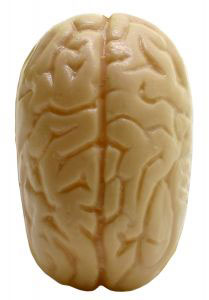 In a follow up to yesterday’s post, I watched the Nightline episode in which Carol Poe’s amazing brain surgery to lose weight was profiled. During the surgery, in which she was awake and responsive, a local anesthetic was applied to her skull. Because the skull and brain contain no pain receptors, no other anesthetic was needed and Poe remained alert and engaged for the duration of the surgery.
In a follow up to yesterday’s post, I watched the Nightline episode in which Carol Poe’s amazing brain surgery to lose weight was profiled. During the surgery, in which she was awake and responsive, a local anesthetic was applied to her skull. Because the skull and brain contain no pain receptors, no other anesthetic was needed and Poe remained alert and engaged for the duration of the surgery.
The neurosurgeons, Dr. Michael Oh and Dr. Donald Whiting, decided to target the brain instead of the stomach to facilitate weight loss. They drilled through both hemispheres of the brain to a depth of about about 10 centimeters, through a pathway of tissue that does not affect other functions, and ended at a point in the hypothalamus, which controls the stomach. A wire was introduced that would eventually carry an electrical impulse, and when activated, the plan was to alter the level of electricity that’s generated by that region naturally, thereby giving Poe the sensation of feeling full.
“During this procedure, when we have the electrode in this target, we will be asking her about stimulation-induced responses, whether she has a feeling of hunger [or] whether she has any memory responses,” Oh explained on Nightline.
The electricity was constantly adjusted to provoke different responses, ranging from feelings of heat and cold to nausea and even actual cravings for desired foods. During the surgery, Poe actually reported craving a Pepsi, her preferred drink of choice.
Once a successful response to satiety is discovered, doctors “implant a permanent generator, and they have this constant electrical current to that part of the brain,” Oh said.
“She got a nausea feeling at higher voltages,” said Whiting. “Our ideal plan would be to set the electrical setting at just below that threshold of nausea where she doesn’t really feel any different but still readjust her weight thermostat so that she can metabolize better and actually eat less if that’s what it takes.”
The three hour surgery was deemed to be successful, with the voltage gradually increased over a period of months. Poe reports that she doesn’t find the same satisfaction in eating, that she feels full quicker, and that, remarkably, the surgery seems to have taken away her cravings.
This type of surgery opens the door to further use of brain stimulation with various addictive activities, but is the risk worth it? Do you think brain surgery is a practical way to lose weight?
